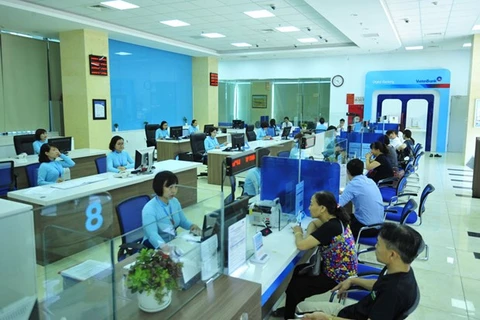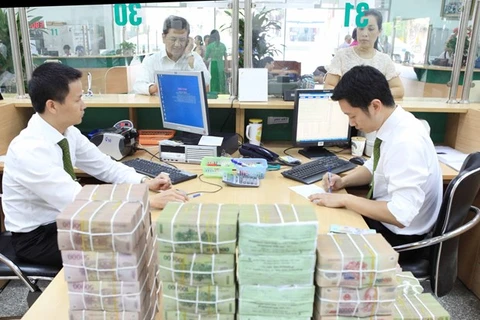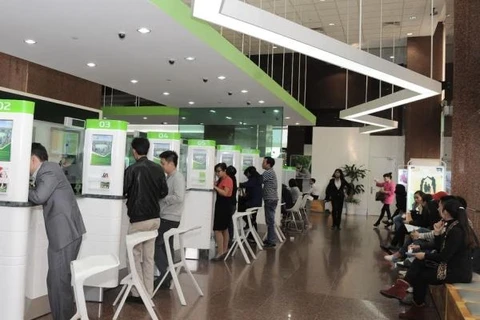Hanoi (VNS/VNA) - The State Bank of Vietnam (SBV) has proposed to issue a separate law on bad debt settlement.
The new law would be based on the provisions of Resolution 42/2017/QH14 to ease the work of settling bad debts.
In a recent report sent to the National Assembly, the SBV said existing policies on bad debt settlement of credit institutions are currently regulated in many different legal documents.
Resolution 42 piloting the bad debt settlement of credit institutions, which was approved by the National Assembly in 2017, will also expire next year.
The SBV, therefore, has proposed to legislate the policies specified in Resolution 42 into a new law to continually enable the banking industry to settle bad debts of credit institutions. The issuance of a new law on bad debt handling will help maintain the settlement of bad debts after the expiry of Resolution 42, helping credit institutions accelerate the handling of bad debts to avoid potential risks for the economy.
Experts also suggested streamlining Resolution 42 to better deal with bad debts.
According to banking expert Can Van Luc, one of the major problems when dealing with bad debts currently is the handling of collateral. The right to seize security assets of a credit institution is one of the key contents in Resolution 42, but it does not specify regulations when the borrowers do not cooperate. Therefore, as Resolution 42 will expire next year, Luc said it is necessary to have a law on bad debt settlement with a stronger legal framework.
Lawyer Truong Thanh Duc, director of ANVI Law Firm, said Resolution 42 has a good effect in dealing with bad debts, however, the policy still needs to be further streamlined to improve the handling of bad debts of the banking industry.
Though the banking industry has still actively taken measures to handle bad debts and limit newly arising bad debts, the debts tended to increase in the first months of the year due to the impact of the COVID-19 pandemic. By the end of June 2021, the bad debt ratio was 1.73 percent against 1.69 percent at the end of 2020.
Banks handled 78.86 trillion VND in the first six months of 2021 through provisions and debt sales.
From August 15, 2017 to June 30, 2021, 359.41 trillion VND of bad debt was recovered according to Resolution 42.
The results are positive, but many warnings showed bad debt will continue to rise again due to the COVID-19 pandemic.
According to the SBV’s statistics, banks restructured loans worth about VNĐ350 trillion for COVID-19-affected borrowers. Industry insiders estimated if half of the loans became bad loans, the bad debt ratio of the banking system would increase to more than 3 percent by the end of this year./.
The new law would be based on the provisions of Resolution 42/2017/QH14 to ease the work of settling bad debts.
In a recent report sent to the National Assembly, the SBV said existing policies on bad debt settlement of credit institutions are currently regulated in many different legal documents.
Resolution 42 piloting the bad debt settlement of credit institutions, which was approved by the National Assembly in 2017, will also expire next year.
The SBV, therefore, has proposed to legislate the policies specified in Resolution 42 into a new law to continually enable the banking industry to settle bad debts of credit institutions. The issuance of a new law on bad debt handling will help maintain the settlement of bad debts after the expiry of Resolution 42, helping credit institutions accelerate the handling of bad debts to avoid potential risks for the economy.
Experts also suggested streamlining Resolution 42 to better deal with bad debts.
According to banking expert Can Van Luc, one of the major problems when dealing with bad debts currently is the handling of collateral. The right to seize security assets of a credit institution is one of the key contents in Resolution 42, but it does not specify regulations when the borrowers do not cooperate. Therefore, as Resolution 42 will expire next year, Luc said it is necessary to have a law on bad debt settlement with a stronger legal framework.
Lawyer Truong Thanh Duc, director of ANVI Law Firm, said Resolution 42 has a good effect in dealing with bad debts, however, the policy still needs to be further streamlined to improve the handling of bad debts of the banking industry.
Though the banking industry has still actively taken measures to handle bad debts and limit newly arising bad debts, the debts tended to increase in the first months of the year due to the impact of the COVID-19 pandemic. By the end of June 2021, the bad debt ratio was 1.73 percent against 1.69 percent at the end of 2020.
Banks handled 78.86 trillion VND in the first six months of 2021 through provisions and debt sales.
From August 15, 2017 to June 30, 2021, 359.41 trillion VND of bad debt was recovered according to Resolution 42.
The results are positive, but many warnings showed bad debt will continue to rise again due to the COVID-19 pandemic.
According to the SBV’s statistics, banks restructured loans worth about VNĐ350 trillion for COVID-19-affected borrowers. Industry insiders estimated if half of the loans became bad loans, the bad debt ratio of the banking system would increase to more than 3 percent by the end of this year./.
VNA
























